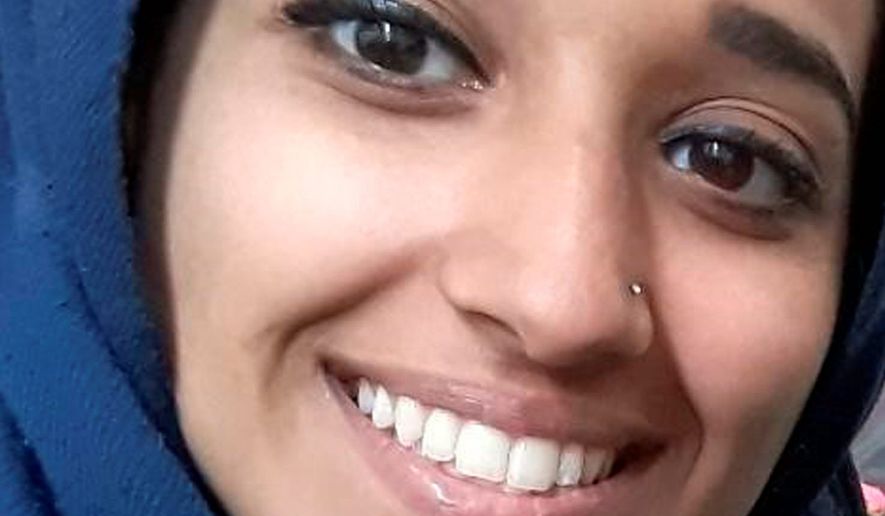The so-called “ISIS bride” who left the U.S. to join the terrorist insurgency in the Middle East but now wants to return with her toddler son to the U.S., has a good case for why she must be let back in, according to legal scholars.
Hoda Muthana was born in New Jersey, which under normal circumstances would have guaranteed her citizenship — but administration officials say her father was here as a diplomat at the time, which is the sole recognized exception to the U.S. birthright citizenship system.
Ahmed Ali Muthana, though, says he was no longer a diplomat when his daughter was born, having been told by Yemen to surrender his diplomatic identity card four months before.
“It is an intriguing case that could well present a serious challenge for the Trump administration. If her father’s diplomatic status ended before her birth, a credible claim exists for citizenship,” said Jonathan Turley, a law professor at the George Washington University.
Ms. Muthana, now 24, left the University of Alabama at Birmingham in 2014, telling her parents she was going on a field trip to Atlanta. However, she took her tuition money and fled to Turkey. She later joined the Islamic State in Syria. She was wed to two fighters, both of whom died.
Ms. Muthana called for the death of Americans while overseas, but now says she made a “big, stupid” mistake.
“I ruined my life,” she recently told CBS News.
Her father filed a lawsuit last month in federal court on behalf of himself and his daughter and grandson, arguing for their return to the U.S.
Mr. Muthana’s lawyer, Charles Swift, says his client’s diplomatic status was terminated by Sept. 1, 1994, or nearly two months before his daughter’s birth, and he remained in the U.S. on a valid visa.
Mr. Muthana also says his wife had been granted entry to the U.S. in July 1994 under a petition for permanent residency, meaning she had independent legal status when she gave birth — which also would validate Ms. Muthana’s birthright citizenship.
U.S. District Judge Reggie B. Walton said last week that the Muthanas’ lawyers made a “valid argument,” but ultimately decided not to expedite the case.
Instead, the legal challenge will continue to brew over the next several months in a federal court in Washington, D.C., while the woman and her baby remain in a detainment camp in Syria.
Ms. Muthana is among a number of women left without a “home” after joining the Islamic State.
Shamima Begum, a 19-year-old “ISIS bride,” seeks to return the United Kingdom after joining the extremist group four years ago. But the U.K. revoked her citizenship, a ruling that Ms. Begum is appealing.
Critics of the women argue they chose to forfeit their right to citizenship by joining the Islamic caliphate and declaring war on the west.
In Ms. Muthana’s case, her parents stayed in the U.S. after her father lost his diplomatic status.
The government admits it used to recognize Ms. Muthana’s citizenship, and even issued her an American passport. But the Obama administration revoked it after she went to join the Islamic State.
The State Department says as far as it’s concerned, Ms. Muthana’s passport was issued in error. According to court documents, the federal government wasn’t notified by the U.N. that Mr. Muthana’s diplomatic status was terminated until February 1995 — more than three months after his daughter was born.
“Reliance on the date of official notification is essential to our foreign relations,” the government argued in court papers.
Under international law, a diplomat and member of his family are subject to the jurisdiction of their home country — Yemen in this case.
The Justice Department also argues Mr. Muthana doesn’t have standing to bring the lawsuit on his daughter’s behalf.
Hina Shamsi, an attorney with the American Civil Liberties Union, said the government’s argument is unusual.
“What’s critical here is that the government is making extraordinary claims in denying citizenship and repatriation, and these claims have to be adjudicated by a court. No matter how unpopular a person or their alleged crimes, the government cannot take away citizenship or fundamental rights unilaterally,” Ms. Shamsi said.
• Alex Swoyer can be reached at aswoyer@washingtontimes.com.




Please read our comment policy before commenting.